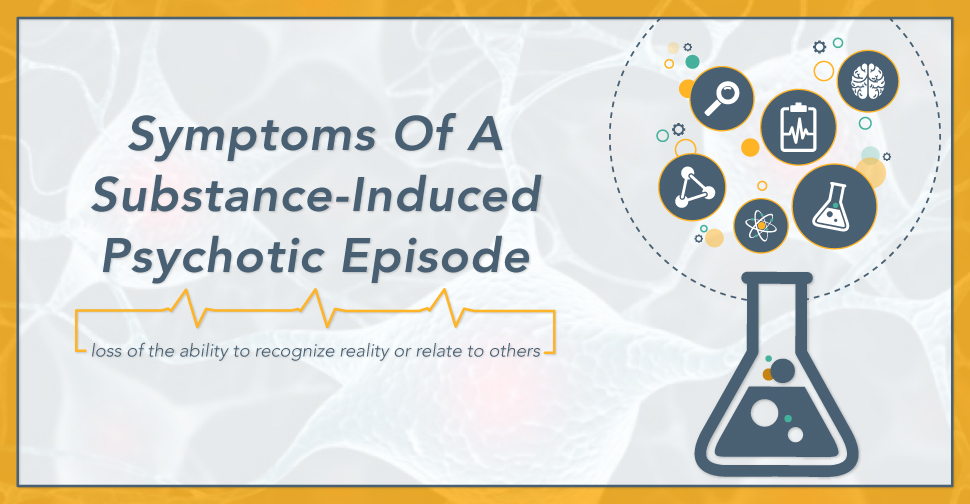
Substance use and abuse carries with it a wide range of risks, many of which can be deliberating, disorientating, and dangerous. In some instances, a person who engages in these at-risk drug or alcohol behaviors may encounter what is called a substance abuse psychotic episode.
What Is A Psychotic Episode And How Does It Manifest Itself?
PubMed Health defines psychosis as “a severe mental disorder in which a person loses the ability to recognize reality or relate to others.” They continue to list the defining symptoms as: “being paranoid, having false ideas about what is taking place or who one is, and seeing, hearing, or feeling things that are not there.”
A drug-induced psychosis is similar in nature, excluding the fact that it can manifest solely due to the substance and not from a present “independent” mental disorder. The severity of this is such that the Diagnostic and Statistical Manual of Mental Disorders, 5th edition (DSM-V), includes substance-induced psychotic disorder. Medscape notes the DSM-V criteria for this as including “evidence from the history, physical examination, or laboratory findings indicates both (1) the hallucinations or delusions developed during or soon after (eg, within a month of) substance intoxication or withdrawal or (2) substance used is etiologically related to the disturbance.”
The Substance Abuse and Mental Health Services Administration (SAMHSA) elaborates on this, stating that “substance-induced disorders are distinct from independent co-occurring mental disorders in that all or most of the psychiatric symptoms are the direct result of substance use.” However, in certain cases this psychosis may occur in someone who has a mental health concern. SAMHSA continues, “this is not to state that substance-induced disorders preclude co-occurring mental disorders, only that the specific symptom cluster at a specific point in time is more likely the result of substance use, abuse, intoxication, or withdrawal than of underlying mental illness.”
This Event May Be Aggravated Or Accompanied By A Co-Occurring Disorder
Some people may have a mental health disorder that can manifest itself in this way. At times, these people may use a drug either recreationally or as a means to self-medicate, which may then cause a drug induced psychosis. These conditions include: bipolar disorder, schizophrenia, schizoaffective disorder, and delusional disorder, among others, and may be comorbid to substance abuse.
Due to this possibility, it is important that a thorough mental health evaluation be conducted to ascertain if the symptoms are due solely, in part, or not at all from the substance use or abuse. The mental health provider must strive to determine if the initial onset of symptoms occurred prior to substance use, if they continued during sustained periods of abstinence, if they continued after the substance use and withdrawal have ceased, or if the severity of symptoms is greater than what would be expected from a certain substance used in the capacity reported.
They must also do a thorough inquiry of your substance abuse history to determine the amount, frequency, and length of use. These determinations will help your medical team establish the best modes of treatment for your situation.
It can be extremely harmful and even dangerous if a person is not treated fully for the exact root of the problem. Mental health disorders may many times precede drug use as people with these conditions may seek to self-medicate them through drug use, instead of getting the proper care they need. If a person is striving to overcome a substance abuse disorder, they must also seek to treat any co-occurring mental health concerns in order to help alleviate these stressors and triggers.
What Happens During A Substance-Induced Psychotic Episode?
The Merck Manual states that a “substance/medication–induced psychotic disorder is characterized by hallucinations and/or delusions due to the direct effects of a substance or withdrawal from a substance in the absence of delirium.” During a drug-induced psychotic episode, either one or both of these two prevalent experiences may occur. The National Alliance on Mental Illness defines them, and their defining characteristics here:
Hallucinations are seeing, hearing, or physically feeling things that aren’t actually there. For example:
- Voices telling you to commit acts of violence or self-harm
- Feeling like something is crawling under your skin
- Seeing someone take the shape of something he is not, such as a demon
Delusions are strong beliefs that are unlikely to be true and may seem irrational to others. For example:
- Believing external forces are controlling your thoughts, feelings, and behavior
- Believing that trivial remarks, events, or objects have personal meaning or significance
- Thinking you have special powers, are on a special mission, or even that you are God
What Type Of Substances Can Cause This?
Every person has physiological concerns that are unique to them. For this reason, a substance may affect one person in a way that is different from the next. Just because someone else took a substance in a certain proportion does not mean that you will react the same way they did or that you will be free from danger.
Also, just because you’ve taken a substance in the past does not mean that you’re in the clear. A substance may be laced, cut, or mixed with another substance or substances; or due to physiological variances in your body, you may react to it differently, in a way that could be very dangerous. The risks and dangers of substance use and abuse can vary based on a person’s gender, genetic disposition, physical and mental health, and other factors.
It is important to note, as SAMHSA mentions that “virtually any substance taken in very large quantities over a long enough period can lead to a psychotic state.”
Health.am outlines the class of substances that are known to cause psychotic episodes or disorders and the circumstances under which they do so.
Intoxication:
- Alcohol
- Amphetamine and related substances
- Cannabis
- Cocaine
- Hallucinogens
- Inhalants
- Opioids (meperidine)
- Phencyclidine and related substances
- Sedatives, hypnotics, and anxiolytics
- Other or unknown substances
Withdrawal:
- Alcohol
- Sedatives
- Hypnotics and anxiolytics
- Other or unknown substances
It is also reported that certain over-the-counter or prescription drugs may cause psychotic symptoms including, but not limited to the following: pseudoephedrine, phenylephrine, muscle relaxants, anticonvulsants, antihistamines, chemotherapeutic agents, and certain antidepressant medications.
Other non-drug toxins may also initiate these symptoms. Some examples as reported by health.am include “anticholinesterase, organophosphate insecticides, nerve gases, carbon monoxide, carbon dioxide, and volatile substances such as fuel or paint.”
Keep in mind, any time you use more than one drug concurrently, your risk increases.
How Is This Treated?
If you find that you or someone close to you is experiencing this, it is crucially important that the medical support team is made aware of any and all drug use, even if they are drugs that you do not believe to be responsible for the event.
The Oxford Journals Schizophrenia Bulletin write that “most substance-induced psychotic symptoms are considered to be short lived and to resolve with sustained abstinence along with other symptoms of substance intoxication and withdrawal.” Certain drugs may result in more prolonged psychotic episodes, the Merck Manual states that “psychosis triggered by amphetamines, cocaine, or PCP may persist for many weeks.”
Even though you might think that a person may be able to regain their senses within the quiet of their own home, you must, for their welfare and safety, keep in mind the nature of the symptoms of these psychotic episodes. Some manifestations of certain hallucinations may encourage a person to harm themselves or those around them. It is for these reasons that a person should be supervised by a staff that is highly-trained and educated in such manners.
When a person is encountering the overwhelming symptoms of one of these episodes, the best thing is to get them to a calm, medically supervised environment where they can be observed.
Benzodiazepines, antipsychotics, or anxiolytics may be administered. Treatment varies on the substance, in example the Merck Manual suggests that “for psychosis due to dopamine-stimulating drugs such as amphetamine, an antipsychotic drug is most effective…for substances with actions that do not involve dopamine, observation may be all that is needed, or an anxiolytic may help.”
If the psychotic episode is a result of withdrawal, it is especially important that a person seek medical help immediately. Unaccompanied withdrawal from certain substances may be very dangerous and even deadly. Also, in this instance, in addition to the psychotic manifestations, there are other symptoms of withdrawal that may require medical support and attention.
In the majority of cases, treatment should extend beyond that which treats the substance-induced psychotic disorder. Even if a person is no longer experiencing an episode, the presence of it suggests what could be a serious and underlying substance abuse disorder. A person should be evaluated for such and the necessary treatment options should be discussed. Treatment options include therapy, either individual or group, or a rehabilitation program.
Let Us Help You Find Clarity Within The Confusion
 Substance abuse can complicate your life by creating intense confusion and in the worst and most severe of cases, it can completely uproot reality. This can leave you stranded, without your bearings, amidst a situation that can damage your mental and emotional health and that of those around you. If you’re fearful that yourself or someone you love may be engaging in drug or alcohol use that could result in a psychotic episode, or if one has already occurred, please reach out to us so that we can help you resolve the situation and regain the mental, emotional, and physical balance and wellness that you deserve. Contact us today at DrugRehab.org.
Substance abuse can complicate your life by creating intense confusion and in the worst and most severe of cases, it can completely uproot reality. This can leave you stranded, without your bearings, amidst a situation that can damage your mental and emotional health and that of those around you. If you’re fearful that yourself or someone you love may be engaging in drug or alcohol use that could result in a psychotic episode, or if one has already occurred, please reach out to us so that we can help you resolve the situation and regain the mental, emotional, and physical balance and wellness that you deserve. Contact us today at DrugRehab.org.
